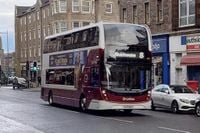The debate over free bus travel for young people has reached a fever pitch in the United Kingdom, as new survey data and rising concerns about anti-social behavior on public transport have thrust the issue into the national spotlight. On August 16, 2025, a YouGov survey revealed that 57% of nearly 9,000 UK adults support extending free bus travel to all passengers under the age of 22, while 32% oppose the idea and 11% remain undecided. The proposal, championed by the Transport Select Committee, aims to improve young people’s access to work and educational opportunities and to encourage long-term public transport use, according to reporting by ChronicleLive.
Labour MP Ruth Cadbury, chair of the committee, argued that the measure would “equalise opportunity” for young people traveling to school, college, university, and their first jobs by bus. If implemented, the plan would bring England in line with Scotland’s Young Persons’ (Under 22s) Free Bus Travel Scheme, which was introduced in January 2022. That scheme allows young people aged five to 21 to travel for free on buses across Scotland, a move that has been widely praised for making public transport more affordable and accessible.
Wales, meanwhile, offers a one-third discount on fares for people aged 16 to 21, and from September 2025, young Welsh passengers will be able to travel for just £1 per journey. Some parts of England, such as London, already provide discounted or free bus travel for certain youth age groups—16 and 17-year-olds, for example, can benefit from special concessions.
Public opinion on the proposal is far from unanimous. The survey found that opposition is strongest among those aged 65 and over, a group that already enjoys Concessionary Travel Passes starting at age 66 in most of England. This has sparked renewed calls from campaigners to lower the eligibility age for free travel for pensioners to 60, in line with Scotland, Wales, Northern Ireland, and London. A petition on the issue has already surpassed 100,000 signatures, but the Department for Transport has cautioned that “any changes to the statutory scheme must be carefully considered for their impact on its financial sustainability,” noting that the existing concessionary travel scheme costs around £700 million per year.
Bus fares for all passengers in England are currently capped at £3 until March 2027, thanks to government intervention aimed at preventing fare hikes and keeping public transport accessible. In the North East, newly elected mayor Kim McGuinness has pledged free travel for under-18s and is moving to bring the region’s bus network under public control. Her authority already provides a £1 fare for young people and free travel for care leavers up to the age of 25.
The Department for Transport has highlighted its commitment to improving bus services, stating, “After decades of decline, we’re providing a record £1 billion in multi-year funding to improve the reliability and frequency of bus services across the country. Our landmark Bus Services Bill will protect routes and prevent services from being scrapped, bringing buses back into local control, and will put passengers at the heart of services. We have also stepped in to prevent a fare hike for passengers by extending the £3 fare cap until March 2027.”
Yet, as the push for expanded free travel gains traction, fresh concerns have emerged about the impact of such schemes on public safety, particularly in Scotland. According to The Scotsman, anti-social behavior on Edinburgh’s buses has been described as “out of control” after new figures showed a rise in incidents. Lothian, the city’s main bus operator, recorded 1,156 incidents of anti-social behavior between January and June 2025—an average of about six incidents per day. This figure is ten higher than the same period in 2024 and about one third more than before free bus travel for under-22s was introduced in 2022.
Of the incidents recorded this year, at least 574 were attributed to youths and 472 to adults, with 72 cases of broken windows and 38 assaults on drivers. The problem appeared to peak in April during the Easter school holidays, when 259 incidents—nearly nine per day—were logged. Anti-social behavior on buses has generally increased since 2019, with 1,399 incidents in the first half of 2023, compared to just 191 in 2020, when COVID-19 restrictions sharply curtailed public transport use.
Scottish Conservatives transport spokesperson Sue Webber did not mince words, stating, “These shocking figures show that anti-social behaviour on board the capital’s bus services has spiralled out of control. No bus driver should go to work fearing for their safety, and no passenger should feel unsafe on public transport. The SNP Government has lost control of law and order and it is frontline workers and families who are paying the price.” Webber called for a range of measures to address the issue, including curfews and, in extreme cases, permanent bans for repeat offenders.
In response, the Scottish Government emphasized that it is considering suspending use of concessionary travel cards on a temporary or permanent basis for those responsible for anti-social behavior. A spokesperson said, “Detailed work on the timescale and best mechanism for achieving this is underway, including robust impact assessments, the development of a behaviour code and whether future primary or secondary legislation is required, to ensure fair decision making. The vast majority of passengers travelling by bus travel safely and responsibly, including people of all ages using their free bus entitlement to travel. However, there is a minority of people, of all ages, who act in a way which can result in harm to bus employees and passengers. That is simply not acceptable.”
Lothian managing director Sarah Boyd, speaking to a Scottish Parliament committee in April, stressed that only a minority of young people are responsible for anti-social incidents and lauded the under-22s free travel scheme for fostering positive travel patterns. “It is important to remember that we are talking about a minority of young people, and that the under-22s scheme is absolutely incredible and has enabled some superb travel patterns to be taken up by our young people. However, if you are the person involved in an incident on the bus—the driver, the victim or another passenger—the experience can be horrendous.”
Edinburgh Bus Users Group offered additional context, noting that with around 60 million Lothian bus journeys during the period in question, only about one trip in 50,000 was affected by anti-social incidents. “There’s many reasons to criticise the SNP Government’s track record on buses, but implying the figures show anti-social behaviour on Edinburgh’s bus services is out of control is wide of the mark,” a spokesperson said.
Police Scotland and Lothian Buses have both reiterated their zero-tolerance approach to anti-social behavior and their commitment to ongoing collaboration to keep public transport safe. Assistant Chief Constable Mark Sutherland stated, “Our officers are committed to reducing antisocial behaviour and violence and we work collaboratively with a range of partners, including bus companies, to help make our communities safer. Scotland has seen an overall reduction in reports of antisocial behaviour incidents.”
As the UK weighs the benefits and challenges of expanding free bus travel for young people, the debate is increasingly shaped by complex trade-offs between accessibility, cost, and public safety. The coming months will likely see policymakers wrestling with these competing priorities as they seek to chart a path forward for the country’s bus networks.




